Analyzing the Impact of Motivation on Employee Retention: Marriott
VerifiedAdded on 2021/01/01
|26
|10032
|407
Report
AI Summary
This report investigates the impact of motivation on employee retention within the hospitality sector, with a specific focus on the Marriott Hotel. The study explores the concept of motivation, different motivational techniques and theories, and the working conditions of employees. It analyzes the factors that influence motivation, interrelates motivation with organizational growth, and recommends methods for improving employee motivation. The report also examines the impact of these recommendations on employee performance and behavior, drawing conclusions about the overall effectiveness of various motivational strategies. Literature review, including research by Grobelna and Marciszewska, Herzberg, and others, provides a theoretical framework for understanding employee motivation and retention. The research methodology includes a questionnaire to collect data on the effect of motivation on employees and the use of scholar articles for gathering secondary information. The report also highlights the importance of a positive work environment, effective communication, and training and development in fostering employee satisfaction and retention.
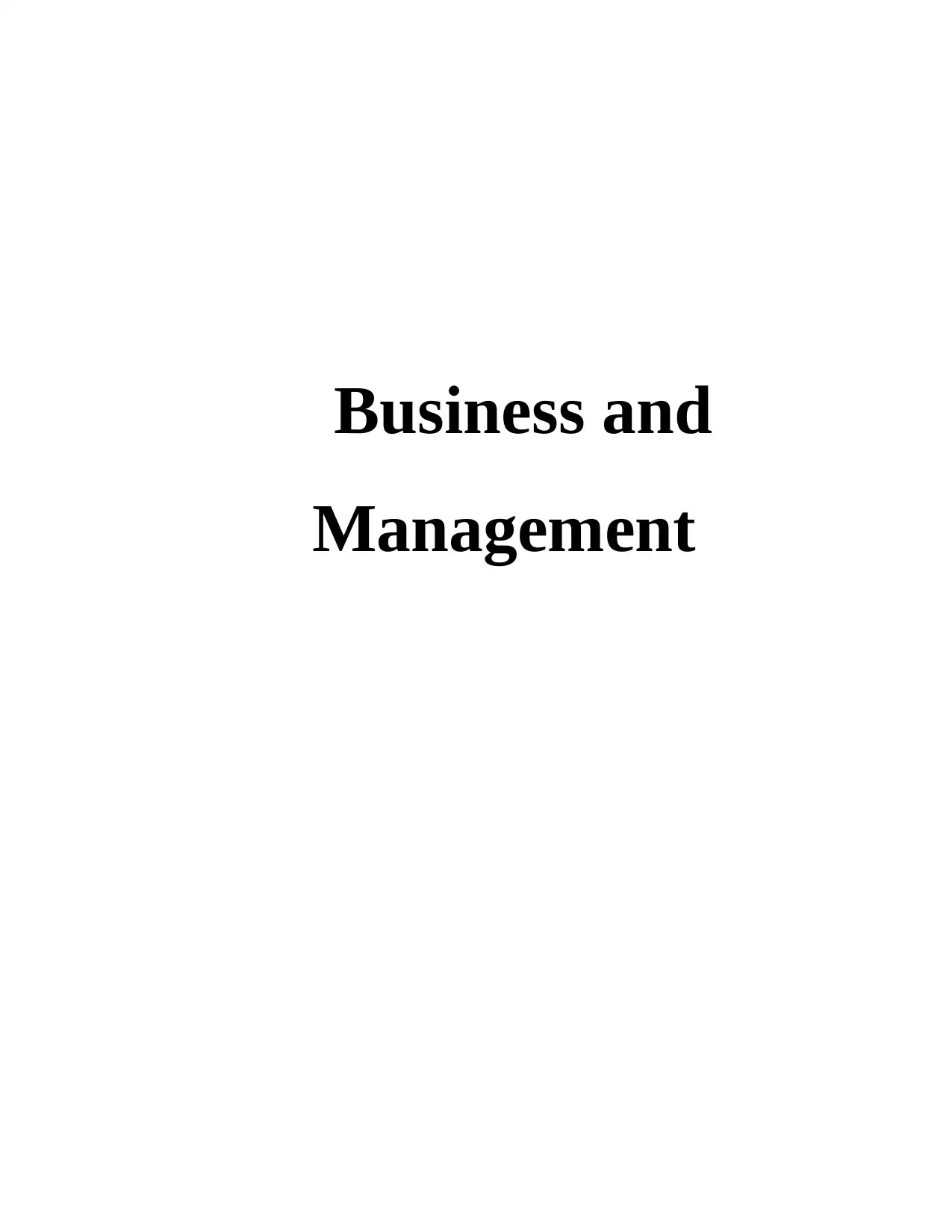
Business and
Management
Management
Paraphrase This Document
Need a fresh take? Get an instant paraphrase of this document with our AI Paraphraser
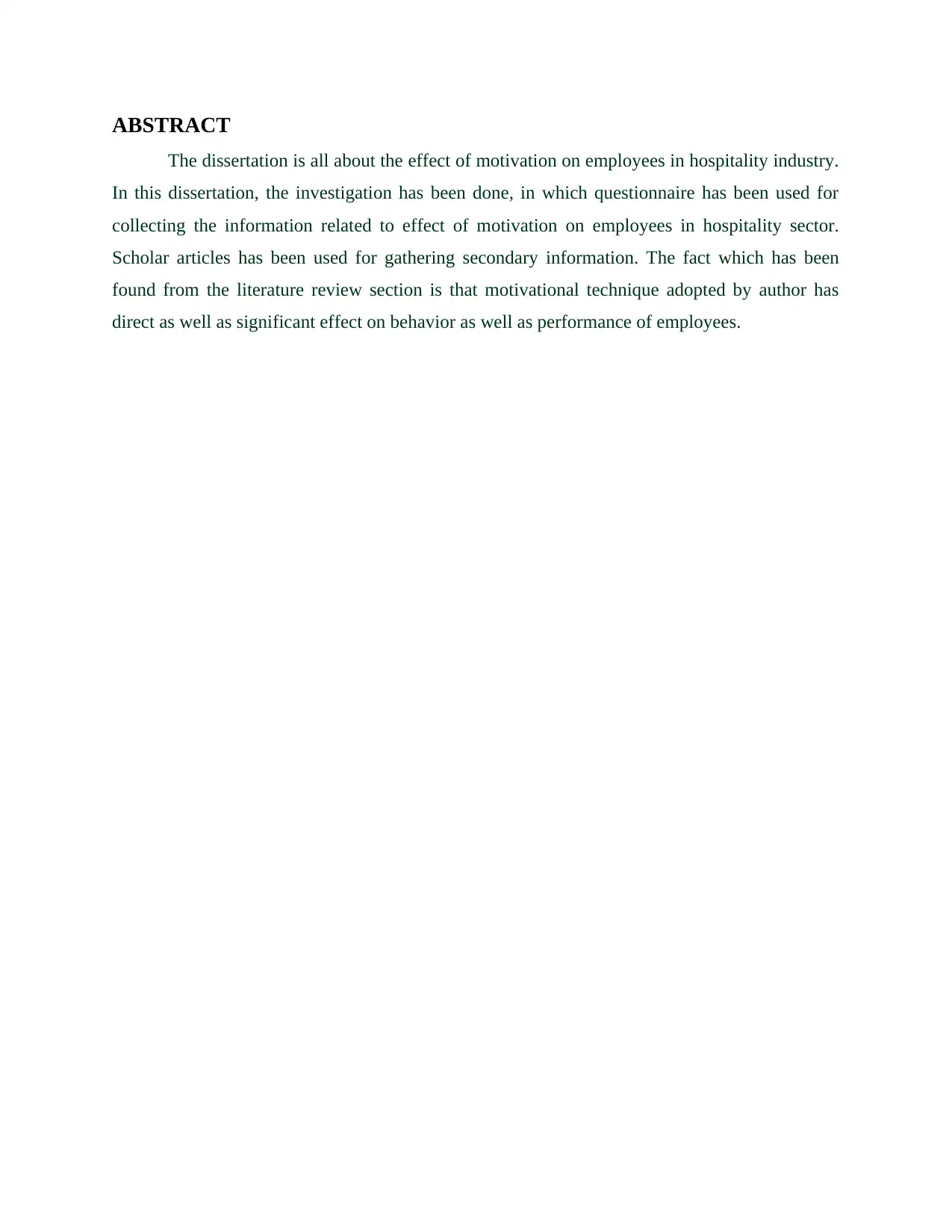
ABSTRACT
The dissertation is all about the effect of motivation on employees in hospitality industry.
In this dissertation, the investigation has been done, in which questionnaire has been used for
collecting the information related to effect of motivation on employees in hospitality sector.
Scholar articles has been used for gathering secondary information. The fact which has been
found from the literature review section is that motivational technique adopted by author has
direct as well as significant effect on behavior as well as performance of employees.
The dissertation is all about the effect of motivation on employees in hospitality industry.
In this dissertation, the investigation has been done, in which questionnaire has been used for
collecting the information related to effect of motivation on employees in hospitality sector.
Scholar articles has been used for gathering secondary information. The fact which has been
found from the literature review section is that motivational technique adopted by author has
direct as well as significant effect on behavior as well as performance of employees.
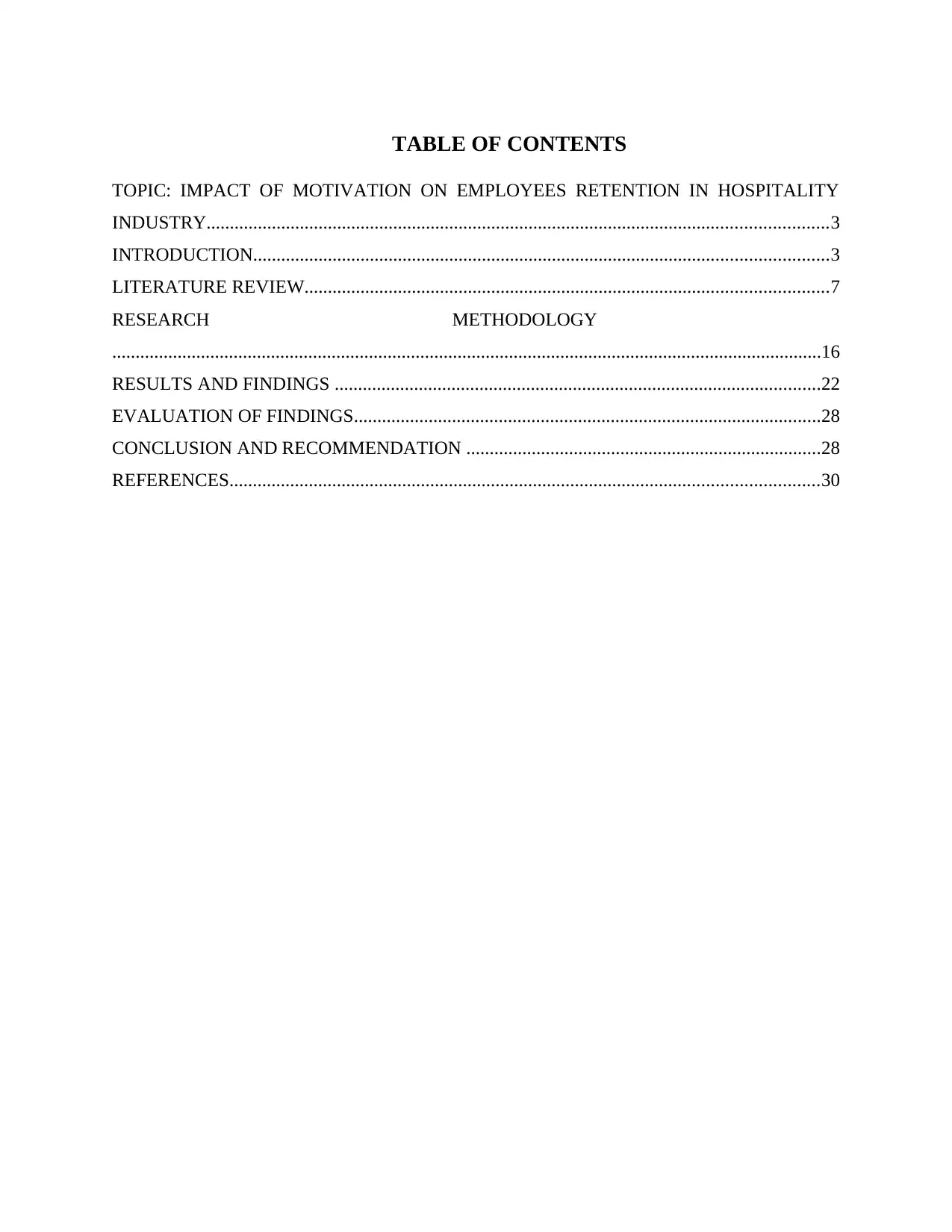
TABLE OF CONTENTS
TOPIC: IMPACT OF MOTIVATION ON EMPLOYEES RETENTION IN HOSPITALITY
INDUSTRY.....................................................................................................................................3
INTRODUCTION...........................................................................................................................3
LITERATURE REVIEW................................................................................................................7
RESEARCH METHODOLOGY
........................................................................................................................................................16
RESULTS AND FINDINGS ........................................................................................................22
EVALUATION OF FINDINGS....................................................................................................28
CONCLUSION AND RECOMMENDATION ............................................................................28
REFERENCES..............................................................................................................................30
TOPIC: IMPACT OF MOTIVATION ON EMPLOYEES RETENTION IN HOSPITALITY
INDUSTRY.....................................................................................................................................3
INTRODUCTION...........................................................................................................................3
LITERATURE REVIEW................................................................................................................7
RESEARCH METHODOLOGY
........................................................................................................................................................16
RESULTS AND FINDINGS ........................................................................................................22
EVALUATION OF FINDINGS....................................................................................................28
CONCLUSION AND RECOMMENDATION ............................................................................28
REFERENCES..............................................................................................................................30
⊘ This is a preview!⊘
Do you want full access?
Subscribe today to unlock all pages.

Trusted by 1+ million students worldwide
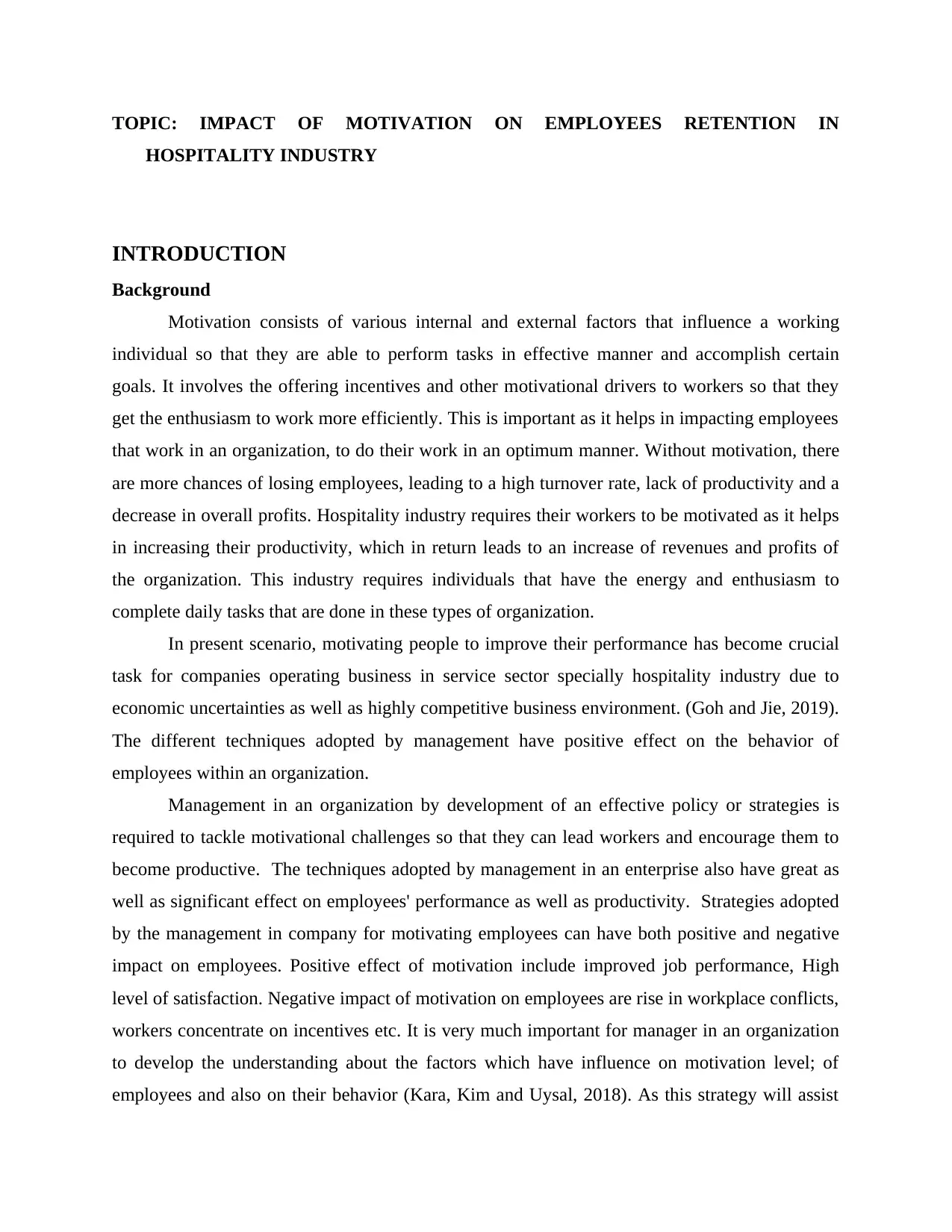
TOPIC: IMPACT OF MOTIVATION ON EMPLOYEES RETENTION IN
HOSPITALITY INDUSTRY
INTRODUCTION
Background
Motivation consists of various internal and external factors that influence a working
individual so that they are able to perform tasks in effective manner and accomplish certain
goals. It involves the offering incentives and other motivational drivers to workers so that they
get the enthusiasm to work more efficiently. This is important as it helps in impacting employees
that work in an organization, to do their work in an optimum manner. Without motivation, there
are more chances of losing employees, leading to a high turnover rate, lack of productivity and a
decrease in overall profits. Hospitality industry requires their workers to be motivated as it helps
in increasing their productivity, which in return leads to an increase of revenues and profits of
the organization. This industry requires individuals that have the energy and enthusiasm to
complete daily tasks that are done in these types of organization.
In present scenario, motivating people to improve their performance has become crucial
task for companies operating business in service sector specially hospitality industry due to
economic uncertainties as well as highly competitive business environment. (Goh and Jie, 2019).
The different techniques adopted by management have positive effect on the behavior of
employees within an organization.
Management in an organization by development of an effective policy or strategies is
required to tackle motivational challenges so that they can lead workers and encourage them to
become productive. The techniques adopted by management in an enterprise also have great as
well as significant effect on employees' performance as well as productivity. Strategies adopted
by the management in company for motivating employees can have both positive and negative
impact on employees. Positive effect of motivation include improved job performance, High
level of satisfaction. Negative impact of motivation on employees are rise in workplace conflicts,
workers concentrate on incentives etc. It is very much important for manager in an organization
to develop the understanding about the factors which have influence on motivation level; of
employees and also on their behavior (Kara, Kim and Uysal, 2018). As this strategy will assist
HOSPITALITY INDUSTRY
INTRODUCTION
Background
Motivation consists of various internal and external factors that influence a working
individual so that they are able to perform tasks in effective manner and accomplish certain
goals. It involves the offering incentives and other motivational drivers to workers so that they
get the enthusiasm to work more efficiently. This is important as it helps in impacting employees
that work in an organization, to do their work in an optimum manner. Without motivation, there
are more chances of losing employees, leading to a high turnover rate, lack of productivity and a
decrease in overall profits. Hospitality industry requires their workers to be motivated as it helps
in increasing their productivity, which in return leads to an increase of revenues and profits of
the organization. This industry requires individuals that have the energy and enthusiasm to
complete daily tasks that are done in these types of organization.
In present scenario, motivating people to improve their performance has become crucial
task for companies operating business in service sector specially hospitality industry due to
economic uncertainties as well as highly competitive business environment. (Goh and Jie, 2019).
The different techniques adopted by management have positive effect on the behavior of
employees within an organization.
Management in an organization by development of an effective policy or strategies is
required to tackle motivational challenges so that they can lead workers and encourage them to
become productive. The techniques adopted by management in an enterprise also have great as
well as significant effect on employees' performance as well as productivity. Strategies adopted
by the management in company for motivating employees can have both positive and negative
impact on employees. Positive effect of motivation include improved job performance, High
level of satisfaction. Negative impact of motivation on employees are rise in workplace conflicts,
workers concentrate on incentives etc. It is very much important for manager in an organization
to develop the understanding about the factors which have influence on motivation level; of
employees and also on their behavior (Kara, Kim and Uysal, 2018). As this strategy will assist
Paraphrase This Document
Need a fresh take? Get an instant paraphrase of this document with our AI Paraphraser
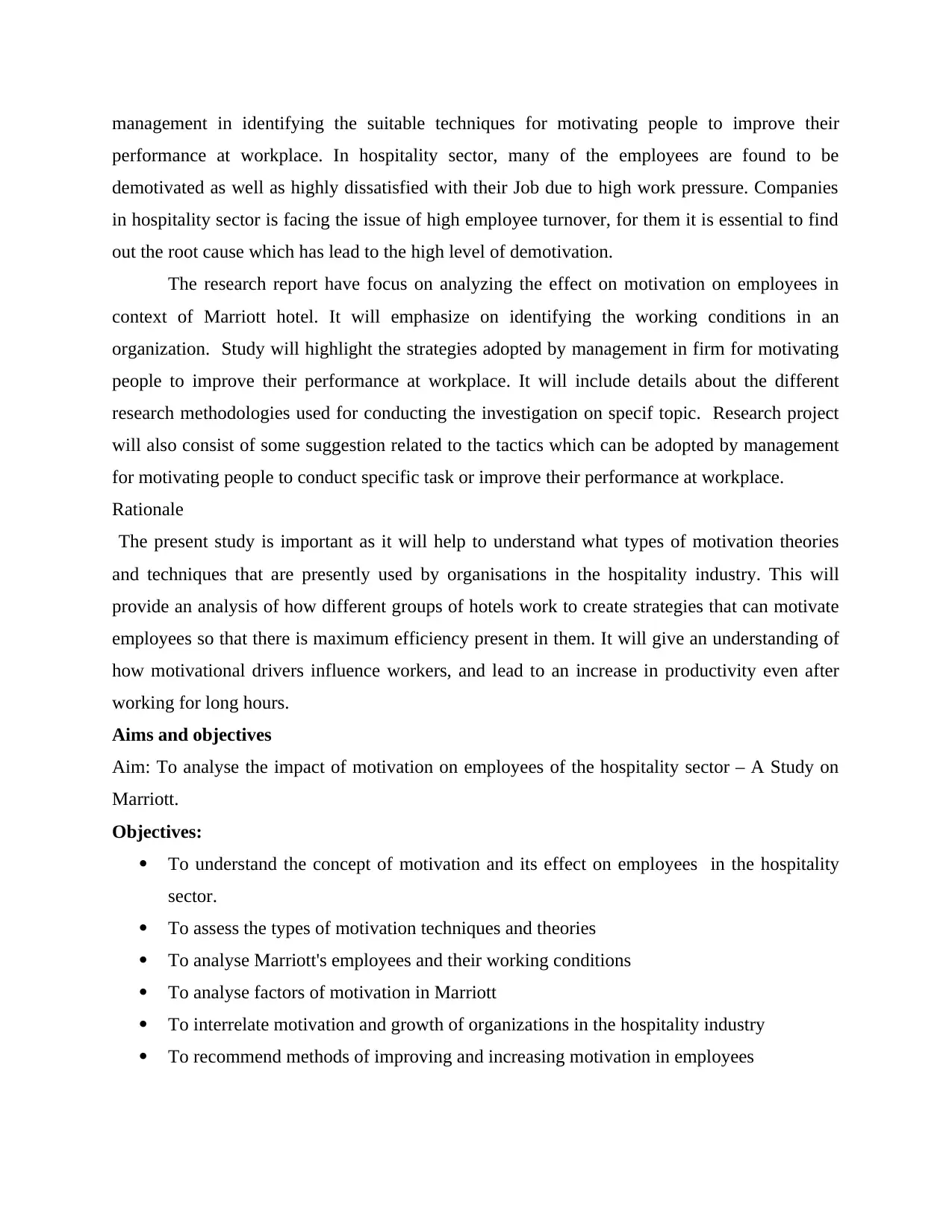
management in identifying the suitable techniques for motivating people to improve their
performance at workplace. In hospitality sector, many of the employees are found to be
demotivated as well as highly dissatisfied with their Job due to high work pressure. Companies
in hospitality sector is facing the issue of high employee turnover, for them it is essential to find
out the root cause which has lead to the high level of demotivation.
The research report have focus on analyzing the effect on motivation on employees in
context of Marriott hotel. It will emphasize on identifying the working conditions in an
organization. Study will highlight the strategies adopted by management in firm for motivating
people to improve their performance at workplace. It will include details about the different
research methodologies used for conducting the investigation on specif topic. Research project
will also consist of some suggestion related to the tactics which can be adopted by management
for motivating people to conduct specific task or improve their performance at workplace.
Rationale
The present study is important as it will help to understand what types of motivation theories
and techniques that are presently used by organisations in the hospitality industry. This will
provide an analysis of how different groups of hotels work to create strategies that can motivate
employees so that there is maximum efficiency present in them. It will give an understanding of
how motivational drivers influence workers, and lead to an increase in productivity even after
working for long hours.
Aims and objectives
Aim: To analyse the impact of motivation on employees of the hospitality sector – A Study on
Marriott.
Objectives:
To understand the concept of motivation and its effect on employees in the hospitality
sector.
To assess the types of motivation techniques and theories
To analyse Marriott's employees and their working conditions
To analyse factors of motivation in Marriott
To interrelate motivation and growth of organizations in the hospitality industry
To recommend methods of improving and increasing motivation in employees
performance at workplace. In hospitality sector, many of the employees are found to be
demotivated as well as highly dissatisfied with their Job due to high work pressure. Companies
in hospitality sector is facing the issue of high employee turnover, for them it is essential to find
out the root cause which has lead to the high level of demotivation.
The research report have focus on analyzing the effect on motivation on employees in
context of Marriott hotel. It will emphasize on identifying the working conditions in an
organization. Study will highlight the strategies adopted by management in firm for motivating
people to improve their performance at workplace. It will include details about the different
research methodologies used for conducting the investigation on specif topic. Research project
will also consist of some suggestion related to the tactics which can be adopted by management
for motivating people to conduct specific task or improve their performance at workplace.
Rationale
The present study is important as it will help to understand what types of motivation theories
and techniques that are presently used by organisations in the hospitality industry. This will
provide an analysis of how different groups of hotels work to create strategies that can motivate
employees so that there is maximum efficiency present in them. It will give an understanding of
how motivational drivers influence workers, and lead to an increase in productivity even after
working for long hours.
Aims and objectives
Aim: To analyse the impact of motivation on employees of the hospitality sector – A Study on
Marriott.
Objectives:
To understand the concept of motivation and its effect on employees in the hospitality
sector.
To assess the types of motivation techniques and theories
To analyse Marriott's employees and their working conditions
To analyse factors of motivation in Marriott
To interrelate motivation and growth of organizations in the hospitality industry
To recommend methods of improving and increasing motivation in employees
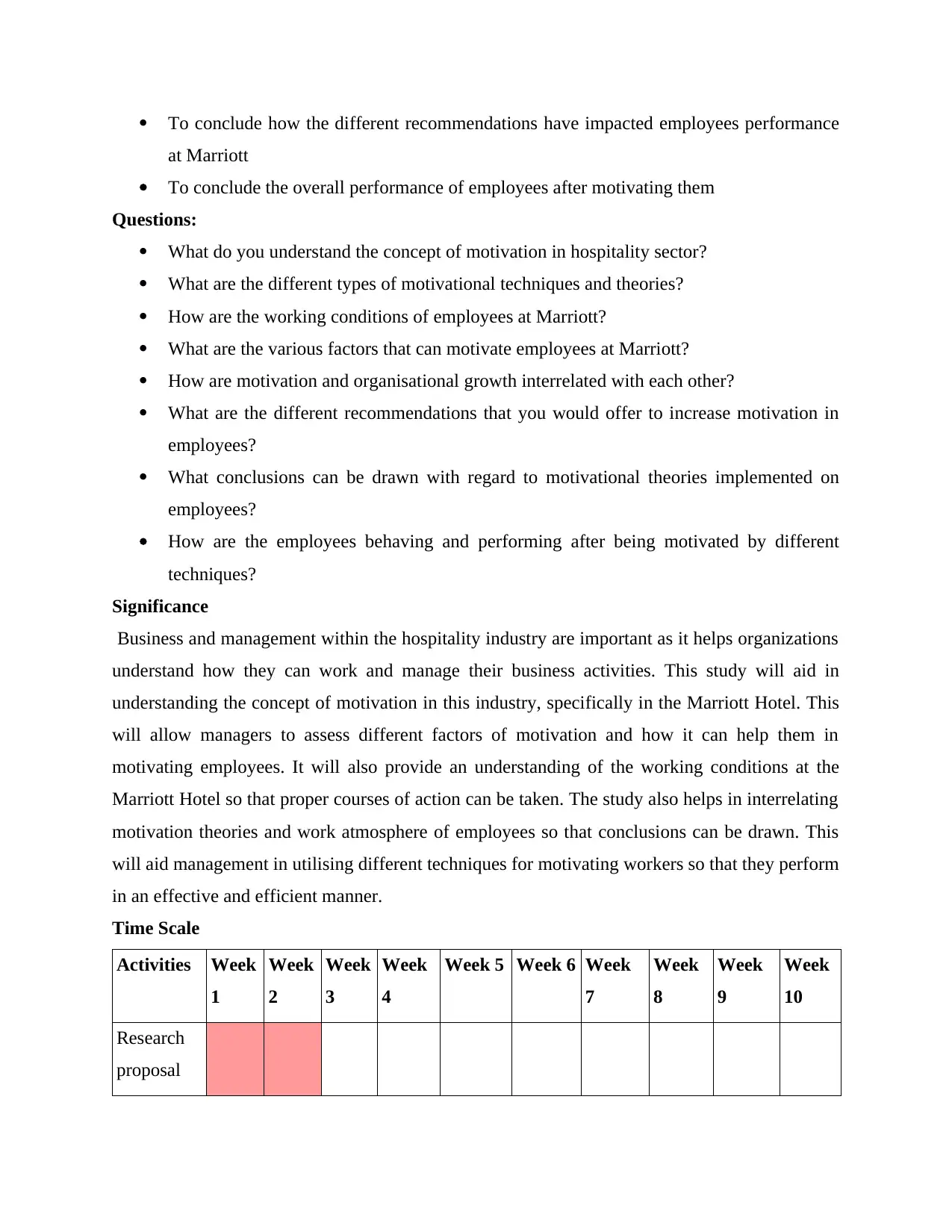
To conclude how the different recommendations have impacted employees performance
at Marriott
To conclude the overall performance of employees after motivating them
Questions:
What do you understand the concept of motivation in hospitality sector?
What are the different types of motivational techniques and theories?
How are the working conditions of employees at Marriott?
What are the various factors that can motivate employees at Marriott?
How are motivation and organisational growth interrelated with each other?
What are the different recommendations that you would offer to increase motivation in
employees?
What conclusions can be drawn with regard to motivational theories implemented on
employees?
How are the employees behaving and performing after being motivated by different
techniques?
Significance
Business and management within the hospitality industry are important as it helps organizations
understand how they can work and manage their business activities. This study will aid in
understanding the concept of motivation in this industry, specifically in the Marriott Hotel. This
will allow managers to assess different factors of motivation and how it can help them in
motivating employees. It will also provide an understanding of the working conditions at the
Marriott Hotel so that proper courses of action can be taken. The study also helps in interrelating
motivation theories and work atmosphere of employees so that conclusions can be drawn. This
will aid management in utilising different techniques for motivating workers so that they perform
in an effective and efficient manner.
Time Scale
Activities Week
1
Week
2
Week
3
Week
4
Week 5 Week 6 Week
7
Week
8
Week
9
Week
10
Research
proposal
at Marriott
To conclude the overall performance of employees after motivating them
Questions:
What do you understand the concept of motivation in hospitality sector?
What are the different types of motivational techniques and theories?
How are the working conditions of employees at Marriott?
What are the various factors that can motivate employees at Marriott?
How are motivation and organisational growth interrelated with each other?
What are the different recommendations that you would offer to increase motivation in
employees?
What conclusions can be drawn with regard to motivational theories implemented on
employees?
How are the employees behaving and performing after being motivated by different
techniques?
Significance
Business and management within the hospitality industry are important as it helps organizations
understand how they can work and manage their business activities. This study will aid in
understanding the concept of motivation in this industry, specifically in the Marriott Hotel. This
will allow managers to assess different factors of motivation and how it can help them in
motivating employees. It will also provide an understanding of the working conditions at the
Marriott Hotel so that proper courses of action can be taken. The study also helps in interrelating
motivation theories and work atmosphere of employees so that conclusions can be drawn. This
will aid management in utilising different techniques for motivating workers so that they perform
in an effective and efficient manner.
Time Scale
Activities Week
1
Week
2
Week
3
Week
4
Week 5 Week 6 Week
7
Week
8
Week
9
Week
10
Research
proposal
⊘ This is a preview!⊘
Do you want full access?
Subscribe today to unlock all pages.

Trusted by 1+ million students worldwide
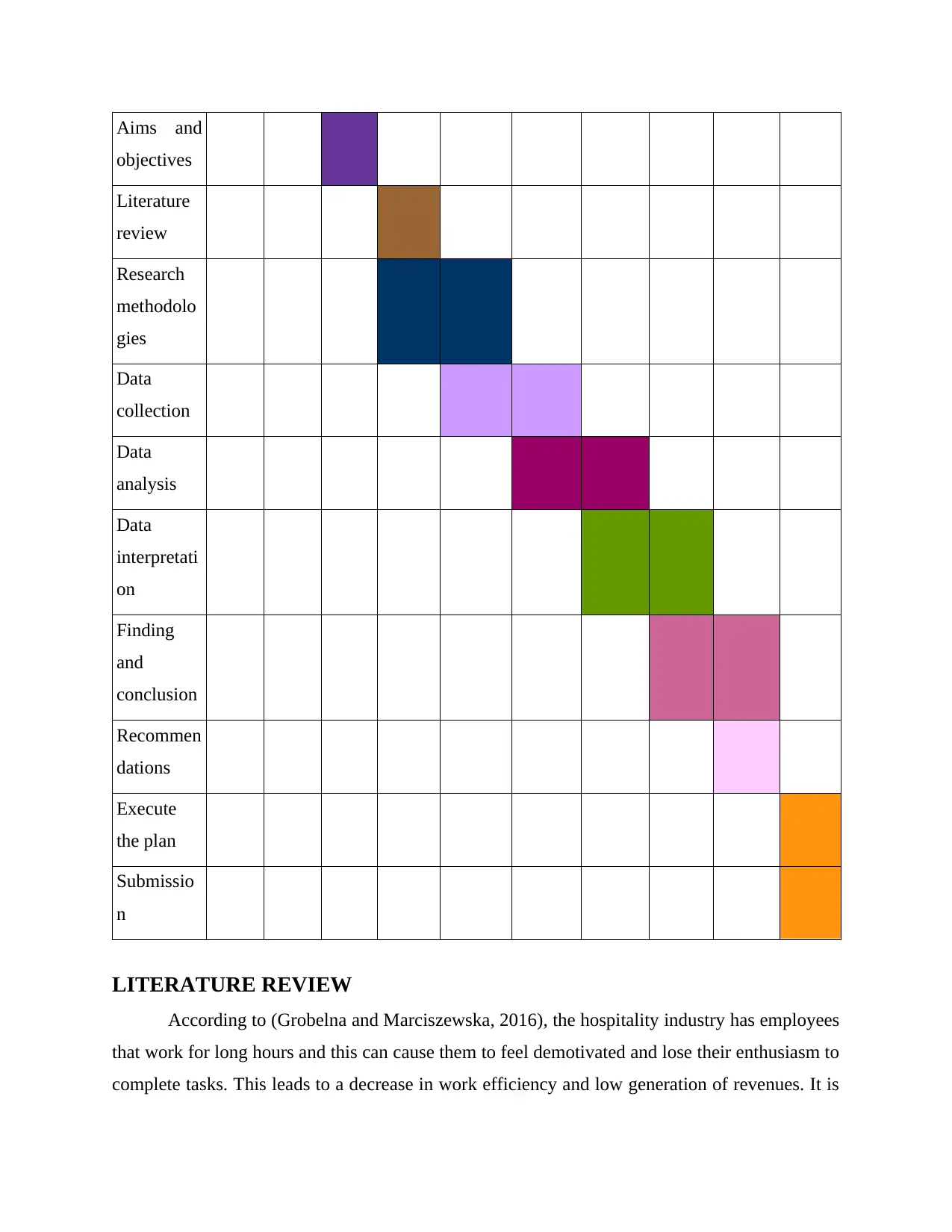
Aims and
objectives
Literature
review
Research
methodolo
gies
Data
collection
Data
analysis
Data
interpretati
on
Finding
and
conclusion
Recommen
dations
Execute
the plan
Submissio
n
LITERATURE REVIEW
According to (Grobelna and Marciszewska, 2016), the hospitality industry has employees
that work for long hours and this can cause them to feel demotivated and lose their enthusiasm to
complete tasks. This leads to a decrease in work efficiency and low generation of revenues. It is
objectives
Literature
review
Research
methodolo
gies
Data
collection
Data
analysis
Data
interpretati
on
Finding
and
conclusion
Recommen
dations
Execute
the plan
Submissio
n
LITERATURE REVIEW
According to (Grobelna and Marciszewska, 2016), the hospitality industry has employees
that work for long hours and this can cause them to feel demotivated and lose their enthusiasm to
complete tasks. This leads to a decrease in work efficiency and low generation of revenues. It is
Paraphrase This Document
Need a fresh take? Get an instant paraphrase of this document with our AI Paraphraser
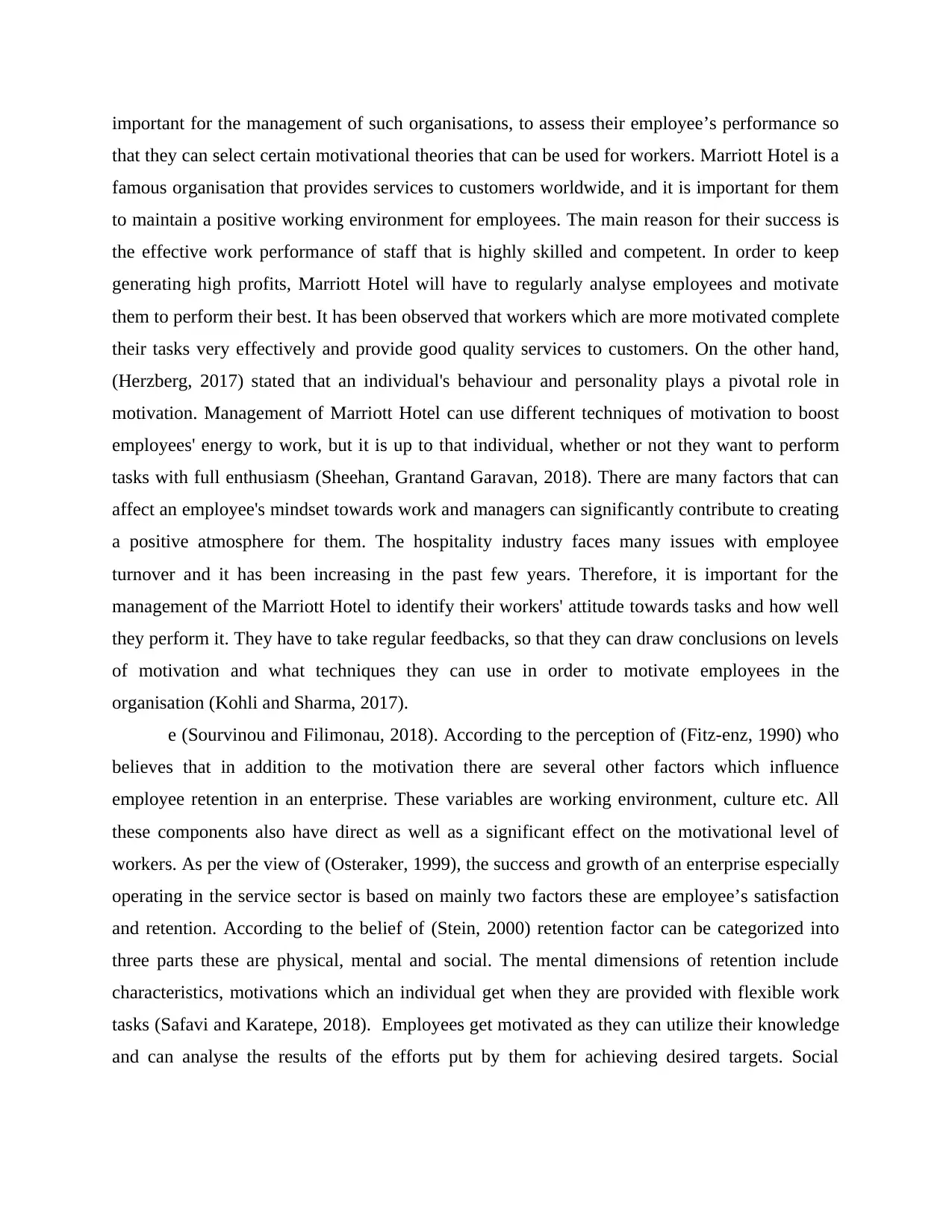
important for the management of such organisations, to assess their employee’s performance so
that they can select certain motivational theories that can be used for workers. Marriott Hotel is a
famous organisation that provides services to customers worldwide, and it is important for them
to maintain a positive working environment for employees. The main reason for their success is
the effective work performance of staff that is highly skilled and competent. In order to keep
generating high profits, Marriott Hotel will have to regularly analyse employees and motivate
them to perform their best. It has been observed that workers which are more motivated complete
their tasks very effectively and provide good quality services to customers. On the other hand,
(Herzberg, 2017) stated that an individual's behaviour and personality plays a pivotal role in
motivation. Management of Marriott Hotel can use different techniques of motivation to boost
employees' energy to work, but it is up to that individual, whether or not they want to perform
tasks with full enthusiasm (Sheehan, Grantand Garavan, 2018). There are many factors that can
affect an employee's mindset towards work and managers can significantly contribute to creating
a positive atmosphere for them. The hospitality industry faces many issues with employee
turnover and it has been increasing in the past few years. Therefore, it is important for the
management of the Marriott Hotel to identify their workers' attitude towards tasks and how well
they perform it. They have to take regular feedbacks, so that they can draw conclusions on levels
of motivation and what techniques they can use in order to motivate employees in the
organisation (Kohli and Sharma, 2017).
e (Sourvinou and Filimonau, 2018). According to the perception of (Fitz-enz, 1990) who
believes that in addition to the motivation there are several other factors which influence
employee retention in an enterprise. These variables are working environment, culture etc. All
these components also have direct as well as a significant effect on the motivational level of
workers. As per the view of (Osteraker, 1999), the success and growth of an enterprise especially
operating in the service sector is based on mainly two factors these are employee’s satisfaction
and retention. According to the belief of (Stein, 2000) retention factor can be categorized into
three parts these are physical, mental and social. The mental dimensions of retention include
characteristics, motivations which an individual get when they are provided with flexible work
tasks (Safavi and Karatepe, 2018). Employees get motivated as they can utilize their knowledge
and can analyse the results of the efforts put by them for achieving desired targets. Social
that they can select certain motivational theories that can be used for workers. Marriott Hotel is a
famous organisation that provides services to customers worldwide, and it is important for them
to maintain a positive working environment for employees. The main reason for their success is
the effective work performance of staff that is highly skilled and competent. In order to keep
generating high profits, Marriott Hotel will have to regularly analyse employees and motivate
them to perform their best. It has been observed that workers which are more motivated complete
their tasks very effectively and provide good quality services to customers. On the other hand,
(Herzberg, 2017) stated that an individual's behaviour and personality plays a pivotal role in
motivation. Management of Marriott Hotel can use different techniques of motivation to boost
employees' energy to work, but it is up to that individual, whether or not they want to perform
tasks with full enthusiasm (Sheehan, Grantand Garavan, 2018). There are many factors that can
affect an employee's mindset towards work and managers can significantly contribute to creating
a positive atmosphere for them. The hospitality industry faces many issues with employee
turnover and it has been increasing in the past few years. Therefore, it is important for the
management of the Marriott Hotel to identify their workers' attitude towards tasks and how well
they perform it. They have to take regular feedbacks, so that they can draw conclusions on levels
of motivation and what techniques they can use in order to motivate employees in the
organisation (Kohli and Sharma, 2017).
e (Sourvinou and Filimonau, 2018). According to the perception of (Fitz-enz, 1990) who
believes that in addition to the motivation there are several other factors which influence
employee retention in an enterprise. These variables are working environment, culture etc. All
these components also have direct as well as a significant effect on the motivational level of
workers. As per the view of (Osteraker, 1999), the success and growth of an enterprise especially
operating in the service sector is based on mainly two factors these are employee’s satisfaction
and retention. According to the belief of (Stein, 2000) retention factor can be categorized into
three parts these are physical, mental and social. The mental dimensions of retention include
characteristics, motivations which an individual get when they are provided with flexible work
tasks (Safavi and Karatepe, 2018). Employees get motivated as they can utilize their knowledge
and can analyse the results of the efforts put by them for achieving desired targets. Social
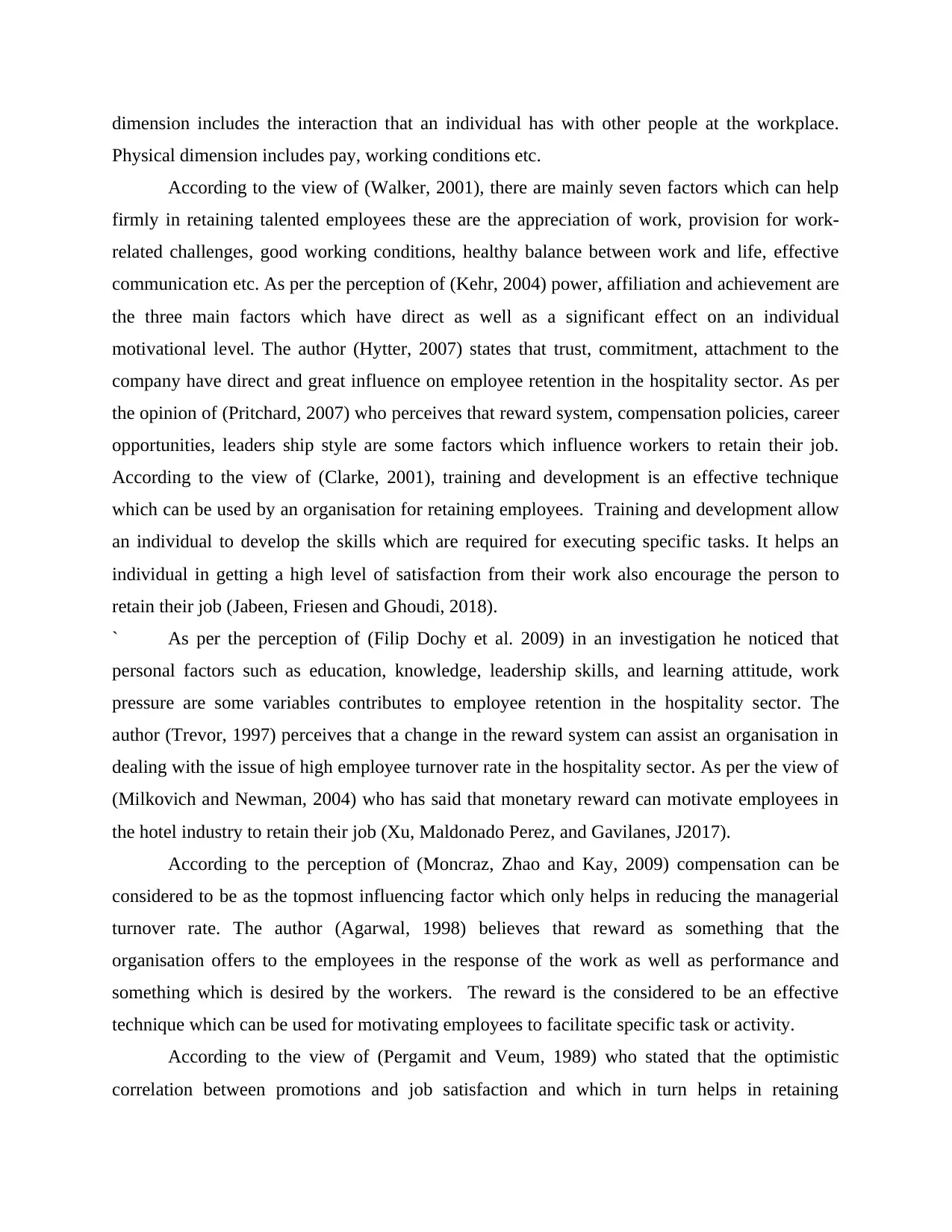
dimension includes the interaction that an individual has with other people at the workplace.
Physical dimension includes pay, working conditions etc.
According to the view of (Walker, 2001), there are mainly seven factors which can help
firmly in retaining talented employees these are the appreciation of work, provision for work-
related challenges, good working conditions, healthy balance between work and life, effective
communication etc. As per the perception of (Kehr, 2004) power, affiliation and achievement are
the three main factors which have direct as well as a significant effect on an individual
motivational level. The author (Hytter, 2007) states that trust, commitment, attachment to the
company have direct and great influence on employee retention in the hospitality sector. As per
the opinion of (Pritchard, 2007) who perceives that reward system, compensation policies, career
opportunities, leaders ship style are some factors which influence workers to retain their job.
According to the view of (Clarke, 2001), training and development is an effective technique
which can be used by an organisation for retaining employees. Training and development allow
an individual to develop the skills which are required for executing specific tasks. It helps an
individual in getting a high level of satisfaction from their work also encourage the person to
retain their job (Jabeen, Friesen and Ghoudi, 2018).
` As per the perception of (Filip Dochy et al. 2009) in an investigation he noticed that
personal factors such as education, knowledge, leadership skills, and learning attitude, work
pressure are some variables contributes to employee retention in the hospitality sector. The
author (Trevor, 1997) perceives that a change in the reward system can assist an organisation in
dealing with the issue of high employee turnover rate in the hospitality sector. As per the view of
(Milkovich and Newman, 2004) who has said that monetary reward can motivate employees in
the hotel industry to retain their job (Xu, Maldonado Perez, and Gavilanes, J2017).
According to the perception of (Moncraz, Zhao and Kay, 2009) compensation can be
considered to be as the topmost influencing factor which only helps in reducing the managerial
turnover rate. The author (Agarwal, 1998) believes that reward as something that the
organisation offers to the employees in the response of the work as well as performance and
something which is desired by the workers. The reward is the considered to be an effective
technique which can be used for motivating employees to facilitate specific task or activity.
According to the view of (Pergamit and Veum, 1989) who stated that the optimistic
correlation between promotions and job satisfaction and which in turn helps in retaining
Physical dimension includes pay, working conditions etc.
According to the view of (Walker, 2001), there are mainly seven factors which can help
firmly in retaining talented employees these are the appreciation of work, provision for work-
related challenges, good working conditions, healthy balance between work and life, effective
communication etc. As per the perception of (Kehr, 2004) power, affiliation and achievement are
the three main factors which have direct as well as a significant effect on an individual
motivational level. The author (Hytter, 2007) states that trust, commitment, attachment to the
company have direct and great influence on employee retention in the hospitality sector. As per
the opinion of (Pritchard, 2007) who perceives that reward system, compensation policies, career
opportunities, leaders ship style are some factors which influence workers to retain their job.
According to the view of (Clarke, 2001), training and development is an effective technique
which can be used by an organisation for retaining employees. Training and development allow
an individual to develop the skills which are required for executing specific tasks. It helps an
individual in getting a high level of satisfaction from their work also encourage the person to
retain their job (Jabeen, Friesen and Ghoudi, 2018).
` As per the perception of (Filip Dochy et al. 2009) in an investigation he noticed that
personal factors such as education, knowledge, leadership skills, and learning attitude, work
pressure are some variables contributes to employee retention in the hospitality sector. The
author (Trevor, 1997) perceives that a change in the reward system can assist an organisation in
dealing with the issue of high employee turnover rate in the hospitality sector. As per the view of
(Milkovich and Newman, 2004) who has said that monetary reward can motivate employees in
the hotel industry to retain their job (Xu, Maldonado Perez, and Gavilanes, J2017).
According to the perception of (Moncraz, Zhao and Kay, 2009) compensation can be
considered to be as the topmost influencing factor which only helps in reducing the managerial
turnover rate. The author (Agarwal, 1998) believes that reward as something that the
organisation offers to the employees in the response of the work as well as performance and
something which is desired by the workers. The reward is the considered to be an effective
technique which can be used for motivating employees to facilitate specific task or activity.
According to the view of (Pergamit and Veum, 1989) who stated that the optimistic
correlation between promotions and job satisfaction and which in turn helps in retaining
⊘ This is a preview!⊘
Do you want full access?
Subscribe today to unlock all pages.

Trusted by 1+ million students worldwide
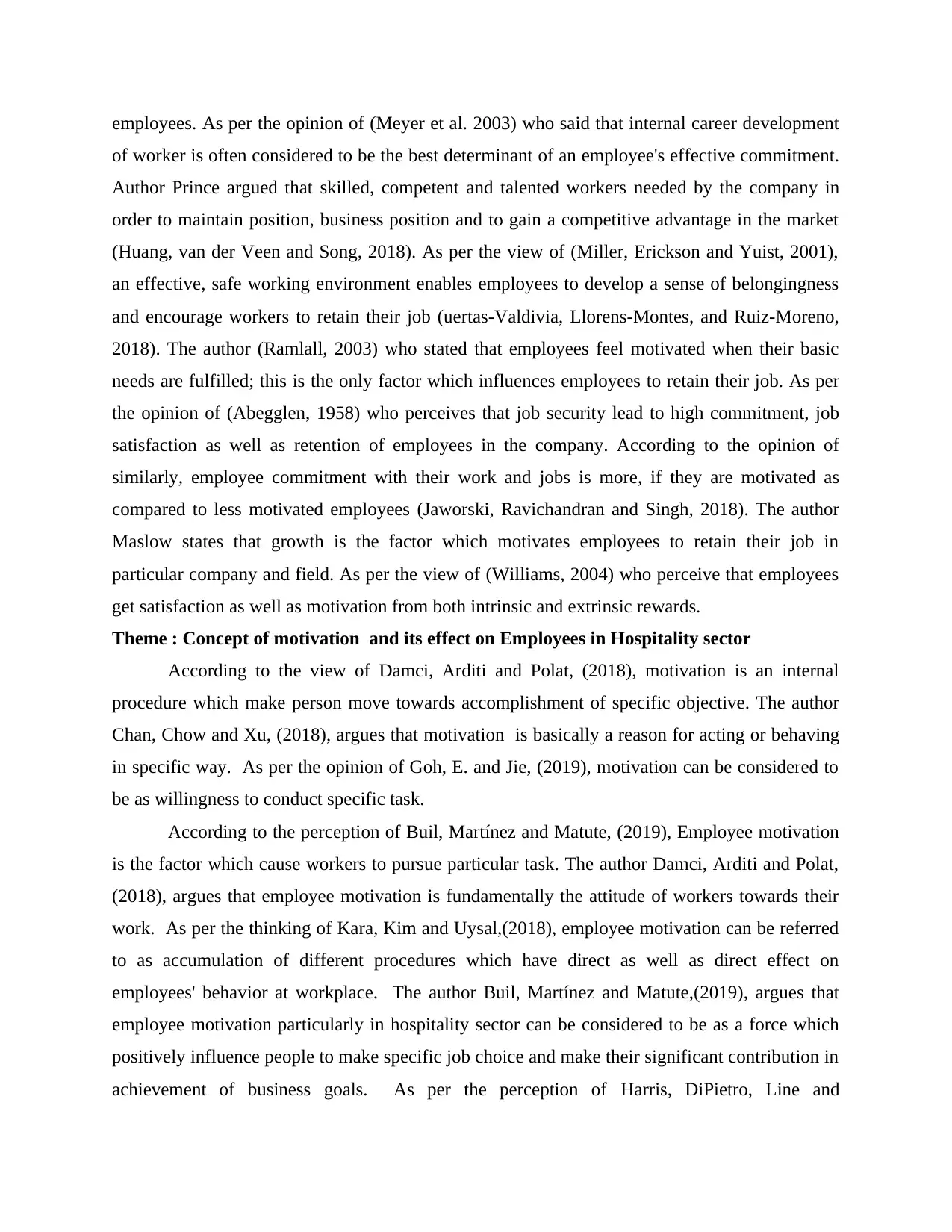
employees. As per the opinion of (Meyer et al. 2003) who said that internal career development
of worker is often considered to be the best determinant of an employee's effective commitment.
Author Prince argued that skilled, competent and talented workers needed by the company in
order to maintain position, business position and to gain a competitive advantage in the market
(Huang, van der Veen and Song, 2018). As per the view of (Miller, Erickson and Yuist, 2001),
an effective, safe working environment enables employees to develop a sense of belongingness
and encourage workers to retain their job (uertas-Valdivia, Llorens-Montes, and Ruiz-Moreno,
2018). The author (Ramlall, 2003) who stated that employees feel motivated when their basic
needs are fulfilled; this is the only factor which influences employees to retain their job. As per
the opinion of (Abegglen, 1958) who perceives that job security lead to high commitment, job
satisfaction as well as retention of employees in the company. According to the opinion of
similarly, employee commitment with their work and jobs is more, if they are motivated as
compared to less motivated employees (Jaworski, Ravichandran and Singh, 2018). The author
Maslow states that growth is the factor which motivates employees to retain their job in
particular company and field. As per the view of (Williams, 2004) who perceive that employees
get satisfaction as well as motivation from both intrinsic and extrinsic rewards.
Theme : Concept of motivation and its effect on Employees in Hospitality sector
According to the view of Damci, Arditi and Polat, (2018), motivation is an internal
procedure which make person move towards accomplishment of specific objective. The author
Chan, Chow and Xu, (2018), argues that motivation is basically a reason for acting or behaving
in specific way. As per the opinion of Goh, E. and Jie, (2019), motivation can be considered to
be as willingness to conduct specific task.
According to the perception of Buil, Martínez and Matute, (2019), Employee motivation
is the factor which cause workers to pursue particular task. The author Damci, Arditi and Polat,
(2018), argues that employee motivation is fundamentally the attitude of workers towards their
work. As per the thinking of Kara, Kim and Uysal,(2018), employee motivation can be referred
to as accumulation of different procedures which have direct as well as direct effect on
employees' behavior at workplace. The author Buil, Martínez and Matute,(2019), argues that
employee motivation particularly in hospitality sector can be considered to be as a force which
positively influence people to make specific job choice and make their significant contribution in
achievement of business goals. As per the perception of Harris, DiPietro, Line and
of worker is often considered to be the best determinant of an employee's effective commitment.
Author Prince argued that skilled, competent and talented workers needed by the company in
order to maintain position, business position and to gain a competitive advantage in the market
(Huang, van der Veen and Song, 2018). As per the view of (Miller, Erickson and Yuist, 2001),
an effective, safe working environment enables employees to develop a sense of belongingness
and encourage workers to retain their job (uertas-Valdivia, Llorens-Montes, and Ruiz-Moreno,
2018). The author (Ramlall, 2003) who stated that employees feel motivated when their basic
needs are fulfilled; this is the only factor which influences employees to retain their job. As per
the opinion of (Abegglen, 1958) who perceives that job security lead to high commitment, job
satisfaction as well as retention of employees in the company. According to the opinion of
similarly, employee commitment with their work and jobs is more, if they are motivated as
compared to less motivated employees (Jaworski, Ravichandran and Singh, 2018). The author
Maslow states that growth is the factor which motivates employees to retain their job in
particular company and field. As per the view of (Williams, 2004) who perceive that employees
get satisfaction as well as motivation from both intrinsic and extrinsic rewards.
Theme : Concept of motivation and its effect on Employees in Hospitality sector
According to the view of Damci, Arditi and Polat, (2018), motivation is an internal
procedure which make person move towards accomplishment of specific objective. The author
Chan, Chow and Xu, (2018), argues that motivation is basically a reason for acting or behaving
in specific way. As per the opinion of Goh, E. and Jie, (2019), motivation can be considered to
be as willingness to conduct specific task.
According to the perception of Buil, Martínez and Matute, (2019), Employee motivation
is the factor which cause workers to pursue particular task. The author Damci, Arditi and Polat,
(2018), argues that employee motivation is fundamentally the attitude of workers towards their
work. As per the thinking of Kara, Kim and Uysal,(2018), employee motivation can be referred
to as accumulation of different procedures which have direct as well as direct effect on
employees' behavior at workplace. The author Buil, Martínez and Matute,(2019), argues that
employee motivation particularly in hospitality sector can be considered to be as a force which
positively influence people to make specific job choice and make their significant contribution in
achievement of business goals. As per the perception of Harris, DiPietro, Line and
Paraphrase This Document
Need a fresh take? Get an instant paraphrase of this document with our AI Paraphraser
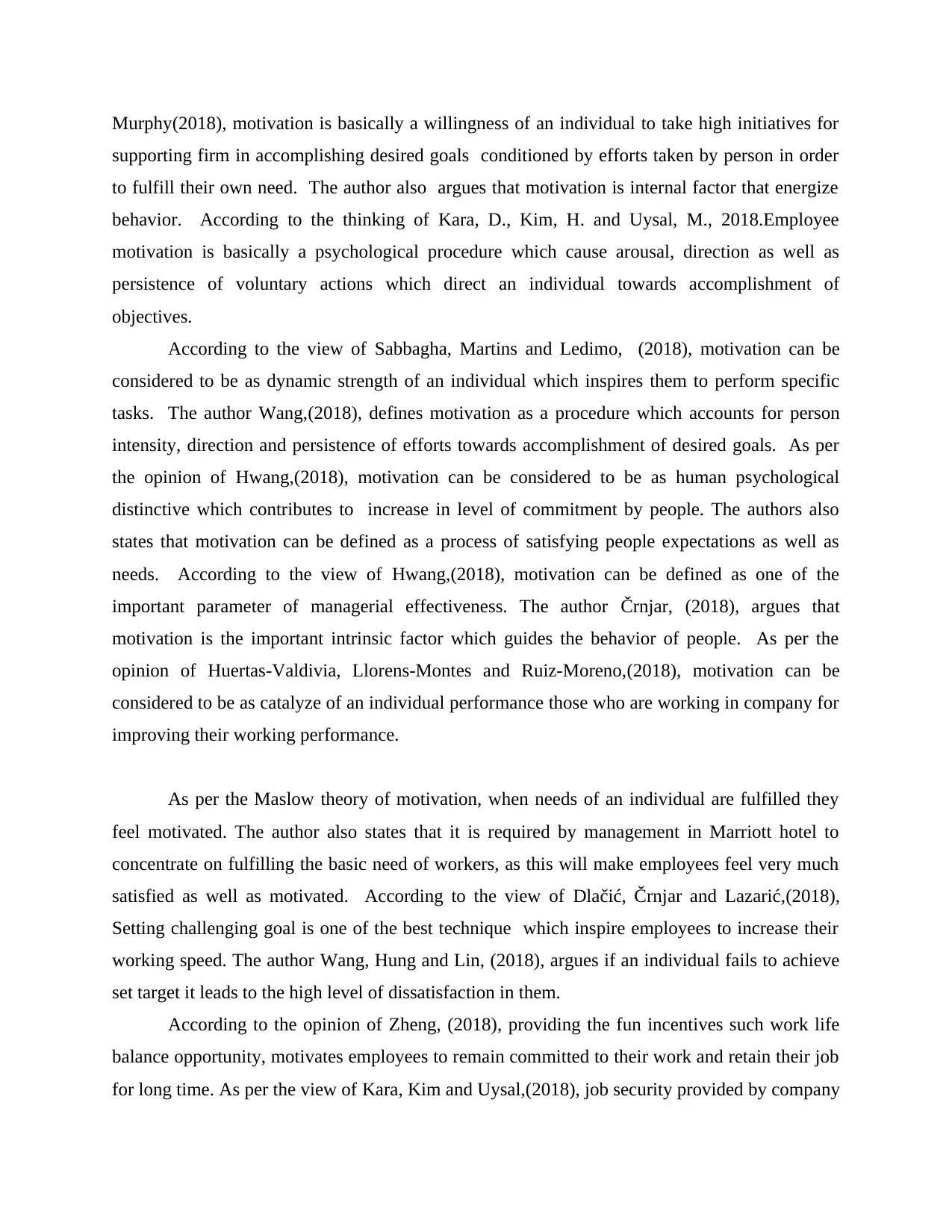
Murphy(2018), motivation is basically a willingness of an individual to take high initiatives for
supporting firm in accomplishing desired goals conditioned by efforts taken by person in order
to fulfill their own need. The author also argues that motivation is internal factor that energize
behavior. According to the thinking of Kara, D., Kim, H. and Uysal, M., 2018.Employee
motivation is basically a psychological procedure which cause arousal, direction as well as
persistence of voluntary actions which direct an individual towards accomplishment of
objectives.
According to the view of Sabbagha, Martins and Ledimo, (2018), motivation can be
considered to be as dynamic strength of an individual which inspires them to perform specific
tasks. The author Wang,(2018), defines motivation as a procedure which accounts for person
intensity, direction and persistence of efforts towards accomplishment of desired goals. As per
the opinion of Hwang,(2018), motivation can be considered to be as human psychological
distinctive which contributes to increase in level of commitment by people. The authors also
states that motivation can be defined as a process of satisfying people expectations as well as
needs. According to the view of Hwang,(2018), motivation can be defined as one of the
important parameter of managerial effectiveness. The author Črnjar, (2018), argues that
motivation is the important intrinsic factor which guides the behavior of people. As per the
opinion of Huertas-Valdivia, Llorens-Montes and Ruiz-Moreno,(2018), motivation can be
considered to be as catalyze of an individual performance those who are working in company for
improving their working performance.
As per the Maslow theory of motivation, when needs of an individual are fulfilled they
feel motivated. The author also states that it is required by management in Marriott hotel to
concentrate on fulfilling the basic need of workers, as this will make employees feel very much
satisfied as well as motivated. According to the view of Dlačić, Črnjar and Lazarić,(2018),
Setting challenging goal is one of the best technique which inspire employees to increase their
working speed. The author Wang, Hung and Lin, (2018), argues if an individual fails to achieve
set target it leads to the high level of dissatisfaction in them.
According to the opinion of Zheng, (2018), providing the fun incentives such work life
balance opportunity, motivates employees to remain committed to their work and retain their job
for long time. As per the view of Kara, Kim and Uysal,(2018), job security provided by company
supporting firm in accomplishing desired goals conditioned by efforts taken by person in order
to fulfill their own need. The author also argues that motivation is internal factor that energize
behavior. According to the thinking of Kara, D., Kim, H. and Uysal, M., 2018.Employee
motivation is basically a psychological procedure which cause arousal, direction as well as
persistence of voluntary actions which direct an individual towards accomplishment of
objectives.
According to the view of Sabbagha, Martins and Ledimo, (2018), motivation can be
considered to be as dynamic strength of an individual which inspires them to perform specific
tasks. The author Wang,(2018), defines motivation as a procedure which accounts for person
intensity, direction and persistence of efforts towards accomplishment of desired goals. As per
the opinion of Hwang,(2018), motivation can be considered to be as human psychological
distinctive which contributes to increase in level of commitment by people. The authors also
states that motivation can be defined as a process of satisfying people expectations as well as
needs. According to the view of Hwang,(2018), motivation can be defined as one of the
important parameter of managerial effectiveness. The author Črnjar, (2018), argues that
motivation is the important intrinsic factor which guides the behavior of people. As per the
opinion of Huertas-Valdivia, Llorens-Montes and Ruiz-Moreno,(2018), motivation can be
considered to be as catalyze of an individual performance those who are working in company for
improving their working performance.
As per the Maslow theory of motivation, when needs of an individual are fulfilled they
feel motivated. The author also states that it is required by management in Marriott hotel to
concentrate on fulfilling the basic need of workers, as this will make employees feel very much
satisfied as well as motivated. According to the view of Dlačić, Črnjar and Lazarić,(2018),
Setting challenging goal is one of the best technique which inspire employees to increase their
working speed. The author Wang, Hung and Lin, (2018), argues if an individual fails to achieve
set target it leads to the high level of dissatisfaction in them.
According to the opinion of Zheng, (2018), providing the fun incentives such work life
balance opportunity, motivates employees to remain committed to their work and retain their job
for long time. As per the view of Kara, Kim and Uysal,(2018), job security provided by company
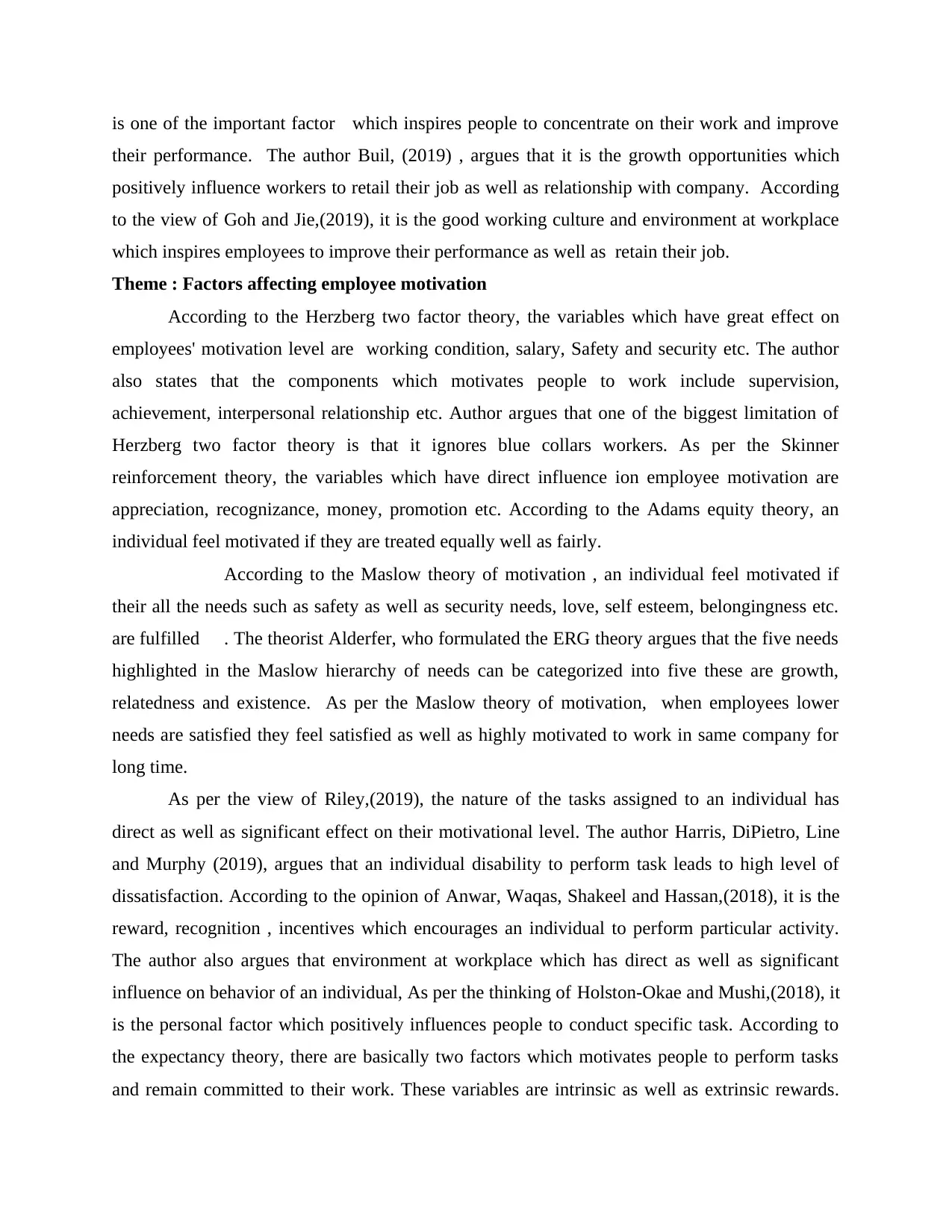
is one of the important factor which inspires people to concentrate on their work and improve
their performance. The author Buil, (2019) , argues that it is the growth opportunities which
positively influence workers to retail their job as well as relationship with company. According
to the view of Goh and Jie,(2019), it is the good working culture and environment at workplace
which inspires employees to improve their performance as well as retain their job.
Theme : Factors affecting employee motivation
According to the Herzberg two factor theory, the variables which have great effect on
employees' motivation level are working condition, salary, Safety and security etc. The author
also states that the components which motivates people to work include supervision,
achievement, interpersonal relationship etc. Author argues that one of the biggest limitation of
Herzberg two factor theory is that it ignores blue collars workers. As per the Skinner
reinforcement theory, the variables which have direct influence ion employee motivation are
appreciation, recognizance, money, promotion etc. According to the Adams equity theory, an
individual feel motivated if they are treated equally well as fairly.
According to the Maslow theory of motivation , an individual feel motivated if
their all the needs such as safety as well as security needs, love, self esteem, belongingness etc.
are fulfilled . The theorist Alderfer, who formulated the ERG theory argues that the five needs
highlighted in the Maslow hierarchy of needs can be categorized into five these are growth,
relatedness and existence. As per the Maslow theory of motivation, when employees lower
needs are satisfied they feel satisfied as well as highly motivated to work in same company for
long time.
As per the view of Riley,(2019), the nature of the tasks assigned to an individual has
direct as well as significant effect on their motivational level. The author Harris, DiPietro, Line
and Murphy (2019), argues that an individual disability to perform task leads to high level of
dissatisfaction. According to the opinion of Anwar, Waqas, Shakeel and Hassan,(2018), it is the
reward, recognition , incentives which encourages an individual to perform particular activity.
The author also argues that environment at workplace which has direct as well as significant
influence on behavior of an individual, As per the thinking of Holston-Okae and Mushi,(2018), it
is the personal factor which positively influences people to conduct specific task. According to
the expectancy theory, there are basically two factors which motivates people to perform tasks
and remain committed to their work. These variables are intrinsic as well as extrinsic rewards.
their performance. The author Buil, (2019) , argues that it is the growth opportunities which
positively influence workers to retail their job as well as relationship with company. According
to the view of Goh and Jie,(2019), it is the good working culture and environment at workplace
which inspires employees to improve their performance as well as retain their job.
Theme : Factors affecting employee motivation
According to the Herzberg two factor theory, the variables which have great effect on
employees' motivation level are working condition, salary, Safety and security etc. The author
also states that the components which motivates people to work include supervision,
achievement, interpersonal relationship etc. Author argues that one of the biggest limitation of
Herzberg two factor theory is that it ignores blue collars workers. As per the Skinner
reinforcement theory, the variables which have direct influence ion employee motivation are
appreciation, recognizance, money, promotion etc. According to the Adams equity theory, an
individual feel motivated if they are treated equally well as fairly.
According to the Maslow theory of motivation , an individual feel motivated if
their all the needs such as safety as well as security needs, love, self esteem, belongingness etc.
are fulfilled . The theorist Alderfer, who formulated the ERG theory argues that the five needs
highlighted in the Maslow hierarchy of needs can be categorized into five these are growth,
relatedness and existence. As per the Maslow theory of motivation, when employees lower
needs are satisfied they feel satisfied as well as highly motivated to work in same company for
long time.
As per the view of Riley,(2019), the nature of the tasks assigned to an individual has
direct as well as significant effect on their motivational level. The author Harris, DiPietro, Line
and Murphy (2019), argues that an individual disability to perform task leads to high level of
dissatisfaction. According to the opinion of Anwar, Waqas, Shakeel and Hassan,(2018), it is the
reward, recognition , incentives which encourages an individual to perform particular activity.
The author also argues that environment at workplace which has direct as well as significant
influence on behavior of an individual, As per the thinking of Holston-Okae and Mushi,(2018), it
is the personal factor which positively influences people to conduct specific task. According to
the expectancy theory, there are basically two factors which motivates people to perform tasks
and remain committed to their work. These variables are intrinsic as well as extrinsic rewards.
⊘ This is a preview!⊘
Do you want full access?
Subscribe today to unlock all pages.

Trusted by 1+ million students worldwide
1 out of 26
Related Documents
Your All-in-One AI-Powered Toolkit for Academic Success.
+13062052269
info@desklib.com
Available 24*7 on WhatsApp / Email
![[object Object]](/_next/static/media/star-bottom.7253800d.svg)
Unlock your academic potential
Copyright © 2020–2026 A2Z Services. All Rights Reserved. Developed and managed by ZUCOL.





